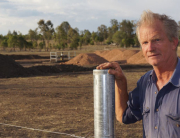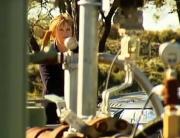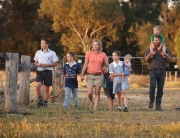Farming and mining
February 2011
For over 40 years the Lloyd family has lived and owned Wieambilla, a 7500 acre property south west of Chinchilla located in the thick of Origin and QGC’s CSG developments. With a 5000 head beef cattle feedlot and a backgrounding and mixed farming operation the concept of co-existence is an issue that the Lloyds personally most certainly question.
The Lloyds involvement with the CSG industry came in 2000 when they were approached by both Origin and QGC who were keen to undertake some exploratory investigations on their tenements that fell over their property. With no knowledge, and little information available of this emerging industry the Lloyds were sceptical. “We were cautious but I think we, like so many others, were naive. We had no comprehension over what was to come and basically had to rely on the word of the company representative,” Katie Lloyd said. “Some of these people were ruthless; they made some outlandish statements and certainly got off on the wrong foot with us.”
With seven exploration wells and an evaporation pond already scattered over the property, it was in 2006 that QGC approached the family to discuss full scale development which would include up to 25 wells, 20km gravel access roads, 10km of underground pipelines and an additional 7.2km pipeline running through the centre of the property. “We were not interested. We could see the damage this proposal meant and the huge impact it would have on both our business and our lifestyle. It would limit us in our future planning and would make some of our ideas completely impossible and this was a risk we were not prepared to take,” Katie said. “Signing off on this agreement would have given us around $25,000 a year in compensation, increasing with CPI for the life of the project. For the impact this proposal would generate, we considered the compensation a long way off the mark.” Subsequently QGC decided to shift their focus to developments elsewhere.
Discussions with Origin commenced in 2008 who outlined their plans to developing their tenement. It included the construction of 15 new wells (on top of their four exploration wells), 15km of gathering pipelines and 17.3km of gravel roads. Negotiations were long and emotionally tough and an agreement was eventually finalised in early 2009. “My parents-in-law signed off on this agreement and they believed they were put in a position where they had no choice but to sign. Origin had time constraints and the threat of land court was being thrown around. By this point they were exhausted and just wanted it to be over and done with,” Katie stated.
Having lived through full scale development Katie and Scott believe there are so many impacts that just simply are not accounted for in a compensation agreement. “So often we’re told that this is an unobtrusive industry, just a small hole in the ground, but we don’t buy that. People need to be aware that even after full scale development you have people, machinery and foreign vehicles always coming onto your property checking, repairing, and maintaining things. You have ongoing phone calls and it’s in your best interest to be aware of what is going on at all times. In the 20 months since development commenced things remain pretty constant,” Katie said.
Scott and Katie’s biggest concern lies around that of underground water. With a 100 per cent reliance on groundwater for their feedlot and an already noted decline in water at two of their bores they can’t help but worry. “Water is everything and this resource simply cannot be compromised. We have been working closely with the companies and the relevant government departments over this issue however don’t feel any more confident,” Scott said. “The clear message to date has been that CSG is the least likely reason as to why our bore water has declined; they all conclude that is more to do with drought or overuse. We have serious trouble accepting this notion considering we already have 165 CSG wells located on or within a 5km radius and so little data available to us about the existence of each.”
One of the largest issues Scott and Katie find hard to comprehend is that of uncertainty. Their reservations over the CSG industry has certainly made them question their own long-term business objectives. “We believe we have a property and a business with a lot of potential and we are at a point in our lives where we are keen to start thinking about putting some of these plans into action. We have opportunities to expand our feedlot, to develop an irrigation licence that would further enhance our farming operation, and make vast improvements to our cattle backgrounding practices. However these are all opportunities that come at a huge expense to us. With no assurance over our the future of our groundwater, and knowing that further CSG development on our property is yet to come, we just cannot commit to these huge investments. The risk is far too great at this stage,” Katie said.
Any development comes at a risk and the Lloyds believe their biggest asset, their land, has already been compromised by CSG development. “Devaluation of a property by CSG development is a taboo subject in the CSG world; it’s something they refuse to acknowledge or believe. We’ve had gas representatives tell us that some banks consider a gas well a bonus, guaranteed income as such, but that overall loss is something that annual compensation, in its current low form, will never ever replace,” Scott said. “Our land valuer even admitted that we had to ensure that our compensation was at a level where it acted as a carat so we could somehow retain our market share and he agreed that our current compensation was a long way off that mark.”
Retaining staff is another huge concern for the Lloyds who currently employ six people from around the Chinchilla region. “We value our staff incredibly and are determined to retain them because of their expertise however because of the huge money being paid by the CSG industry we have to be extremely competitive. Our wages have increased by 35% in the last four years but the reality is there is only so far we can go. It will get to the point where it becomes unviable,” Scott added.
As landholders the Lloyds get tired of hearing the rave reviews this industry gets; the benefits it brings and the huge boost it will be to Queensland’s dire economy. “This development on our land was not something we would have ever agreed to had we had that choice. We are not lulled by the gravel roads or the paltry compensation and we honestly cannot see any benefit to us as landowners,” Katie stated. “I accept that there are short-term benefits this industry brings in terms of jobs and dollars, and that perhaps it will save a few rural communities, but to us, our priority lies on the impacts and effects this industry will have on our family, our lifestyle, our business and our future. We landowners are at the forefront of this industry and I believe we have the most at stake. unfortunately this is something the Government, the CSG industry and its employees simply do not understand or simply refuse to acknowledge.”







